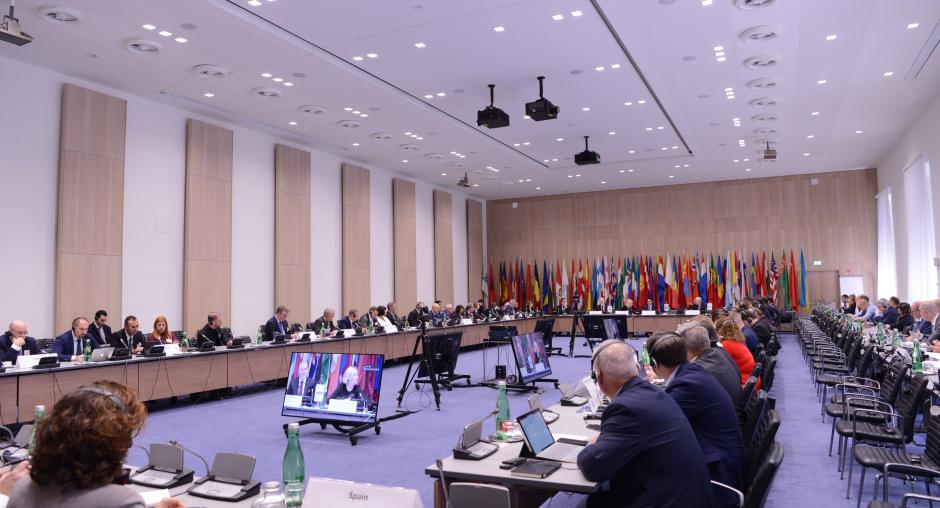OSCE and UNOCT host back-to-back conferences to discuss ways to responsibly use passenger data to prevent travel of foreign terrorist fighters

The OSCE Transnational Threats Department and the United Nations Office of Counter-Terrorism (UNOCT) organized two events from 1 to 4 November 2022 focused on supporting States in implementing passenger data programmes, enhancing coordination between participating States, international organizations, and private sector companies, and deepening regional co-operative partnerships.
From 1 to 2 November, the second annual meeting of the Eastern Europe Informal Working Group (EEIWG) on Passenger Data provided an ongoing forum for intensive technical exchanges focused on: sharing good practices, lessons learned and methodologies in data collection from travelers; exchanging ideas and developments in technologies and new application of passenger data frameworks; and, exploring security analyses across different modes of travel. The meeting also laid the foundation for 2023 events related to the working group, which will be driven by participating States in co-ordination with the OSCE.
Nominations for the annual Chair and Vice-Chair positions were finalized during the EEIWG meeting. The Republic of Kyrgyzstan accepted the nomination by the group to continue as Chair for a second and final year, as did the current Vice-Chairs from Albania, Georgia, Mongolia and Montenegro. The development of informal working groups at the regional level will support the United Nations Countering Terrorist Travel Programme’s initiative to establish regional informal working groups in Eastern Europe as well as Western Africa, Southern Africa, the Middle East and Asia. The 2022 Iteration of the EEIWG also saw participation from Latvia (current European Union IWG Chair) and Sierra Leone (current Western Africa IWG chair), and a joint meeting of the three Chairs to discuss trends and means to build cooperation between regions.
“The regional IWG is a vehicle to promote peer-to-peer discussion, exchange of good practices and lessons learned for the Passenger Information Units (PIUs) in this region. It is also an excellent opportunity to advance implementation of UN Security Council resolutions mandating systemic collection, use and sharing of passenger data to prevent and counter terrorism and organized crime,” said Mauro Miedico, Deputy Director, Chief of Special Projects and Innovation Branch at the United Nations Office of Counter-Terrorism.
Held online and in-person, the second event, the 6th OSCE-wide Seminar on Passenger Data Exchange, brought together more than 200 passenger data experts from OSCE participating States and Partners for Co-operation, international organizations, private sector and other global border management partners. The experts discussed new means for cooperation on the implementation of passenger data programmes; good practices in legislation, operations and security analysis; and future use of passenger data systems in maritime environments.
“Considering the current global context with ongoing armed conflict, post-pandemic travel regulations, surges in traveler numbers and global market challenges affecting States’ economic interests, the importance of enhancing dialogue and increasing cooperation on travel security across the OSCE area cannot be overstated. We are all adapting and innovating to ensure this important exchange of ideas and these partnerships advance," said Alena Kupchyna, OSCE Co-ordinator of Activities to Address Transnational Threats in her opening address.
The continued growth in this event year-over-year speaks to the importance that States, international organizations, border management stakeholders and private industry all place on implementing national travel security systems, and building greater cooperative partnerships to strengthen the security of the OSCE region at large,” she added.
The seminar also examined the technical assistance needs of States for implementing United Nations Security Council Resolutions (UNSCR) 2178, 2396, and 2482. These resolutions mandate States to adopt and use Advance Passenger Information (API) and Passenger Name Record (PNR) for identifying and detecting terrorists and serious criminals in accordance with international law and human rights principles.
Experts from participating States and international organizations also presented on how, in addition to data collected from air passengers, maritime passenger data can be used to provide a broader risk assessment of the threats facing a country. Additional presentations focused on the experience of passenger data system implementation in areas outside the OSCE with a focus on different approaches and lessons learned that could be applied by OSCE participating States.
The seminar also included a networking session for experts featuring IT services and API/PNR analysis systems available from various providers, as well as several air carriers.
